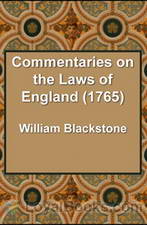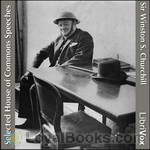|
Books Should Be Free Loyal Books Free Public Domain Audiobooks & eBook Downloads |
|
|
Books Should Be Free Loyal Books Free Public Domain Audiobooks & eBook Downloads |
|
Books on Politics |
|---|
Book type:
Sort by:
View by:
|
By: William Blackstone | |
|---|---|
 Commentaries on the Laws of England (1765)
Commentaries on the Laws of England (1765)
The Commentaries on the Laws of England are an influential 18th century treatise on the common law of England by Sir William Blackstone, originally published by the Clarendon Press at Oxford, 1765-1769.The Commentaries were long regarded as the leading work on the development of English law and played a role in the development of the American legal system. They were in fact the first methodical treatise on the common law suitable for a lay readership since at least the Middle Ages. The common law of England has relied on precedent more than statute and codifications and has been far less amenable than the civil law, developed from the Roman law, to the needs of a treatise... | |
By: William Godwin (1756-1836) | |
|---|---|
 Enquiry Concerning Political Justice and its Influence on Morals and Happiness. Volume 1
Enquiry Concerning Political Justice and its Influence on Morals and Happiness. Volume 1
It was Godwin, in his Enquiry concerning Political Justice , who was the first to formulate the political and economical conceptions of anarchism, even though he did not give that name to the ideas developed in his remarkable work. Laws, he wrote, are not a product of the wisdom of our ancestors: they are the product of their passions, their timidity, their jealousies and their ambition. The remedy they offer is worse than the evils they pretend to cure. - Summary by Peter Kropotkin | |
 Enquiry Concerning Political Justice and its Influence on Morals and Happiness. Volume 2
Enquiry Concerning Political Justice and its Influence on Morals and Happiness. Volume 2
It was Godwin, in his Enquiry concerning Political Justice , who was the first to formulate the political and economical conceptions of anarchism, even though he did not give that name to the ideas developed in his remarkable work. Laws, he wrote, are not a product of the wisdom of our ancestors: they are the product of their passions, their timidity, their jealousies and their ambition. The remedy they offer is worse than the evils they pretend to cure. - Summary by Peter Kropotkin | |
By: William Henry Smyth (1855-1940) | |
|---|---|
 Technocracy
Technocracy
The word technocracy refers to a system of government by technical experts such as scientists, technologists, and engineers. William Henry Smyth is often thought to have invented the term in 1919, although it had in fact been used earlier. | |
By: William James (1842-1910) | |
|---|---|
 The Moral Equivalent of War
The Moral Equivalent of War
The Moral Equivalent of War, the last public utterance of William James, is significant as expressing the opinions of a practical psychologist on a question of growing popular interest. For the past fifteen years the movement for promoting international peace has been enlisting the support of organizations and individuals the world over. That this is a question on which much may be said for the opposition, James, though a pacificist, admits with his usual fair-mindedness, pointing out that militarism... | |
By: William Jennings Bryan (1860-1925) | |
|---|---|
 World’s Famous Orations, Vol. III: Great Britain - I
World’s Famous Orations, Vol. III: Great Britain - I
In 1906, William Jennings Bryan, himself a famous American orator, and Francis Whiting Halsey published a series of the most famous orations of all time. They are ordered by both geographic area and time period, ranging from Ancient Greece to their contemporary United States. The third, fourth, and fifth volumes of this collection concern British speakers. The speeches contained in this third volume are ordered chronologically. We begin in the year 710 AD with a speech on the Saints, and end this volume in 1777 with the realisation of the impossibility of regaining control over the American colonies. - Summary by Carolin | |
 World’s Famous Orations, Vol. IV: Great Britain - II
World’s Famous Orations, Vol. IV: Great Britain - II
In 1906, William Jennings Bryan, himself a famous American orator, and Francis Whiting Halsey published a series of the most famous orations of all time. They are ordered by both geographic area and time period, ranging from Ancient Greece to their contemporary United States. The third, fourth, and fifth volumes of this collection concern British speakers. The speeches contained in this third volume are ordered chronologically. We begin in the year 1781 with a speech on the war in America, and end this volume in the middle of the 19th century with a speech on the "Trent" Affair. - Summary by Carolin | |
 World’s Famous Orations, Vol. V: Great Britain - III
World’s Famous Orations, Vol. V: Great Britain - III
In 1906, William Jennings Bryan, himself a famous American orator, and Francis Whiting Halsey published a series of the most famous orations of all time. They are ordered by both geographic area and time period, ranging from Ancient Greece to their contemporary United States. The third, fourth, and fifth volumes of this collection concern British speakers. The speeches contained in this fifth volume are ordered chronologically. We begin in the year 1865 with a speech on the Canadian Confederation, and end this volume in 1906, the year in which this volume was published, with a couple of speeches on Liberalism. - Summary by Carolin | |
By: William Morris (1834-1896) | |
|---|---|
 News From Nowhere
News From Nowhere
News from Nowhere (1890) is a classic work combining utopian socialism and soft science fiction written by the artist, designer and socialist pioneer William Morris. In the book, the narrator, William Guest, falls asleep after returning from a meeting of the Socialist League and awakes to find himself in a future society based on common ownership and democratic control of the means of production. In this society there is no private property, no big cities, no authority, no monetary system, no divorce, no courts, no prisons, and no class systems... | |
 Signs of Change
Signs of Change
In the 1880s William Morris, the artist and poet famously associated with the Arts and Crafts movement, left the Liberal Party and threw himself into the Socialist cause. He spoke all over the country, on street corners as well as in working men's clubs and lecture halls, and edited and wrote for the Socialist League's monthly newspaper. Signs of Change is a short collection of his talks and writings in this period, first published in 1888, covering such topics as what socialism and work should be, and how capitalism and waste developed. | |
By: William Shakespeare (1564-1616) | |
|---|---|
 King John
King John
The Life and Death of King John, a history play by William Shakespeare, dramatises the reign of John, King of England (ruled 1199–1216), son of Henry II of England and Eleanor of Aquitaine and father of Henry III of England. It is believed to have been written in the mid-1590s but was not published until it appeared in the First Folio in 1623. John (24 December 1166 – 19 October 1216), also known as John Lackland or Softsword, was King of England from 6 April 1199 until his death. His reign... | |
By: William Shuler Harris (b. 1865) | |
|---|---|
 Life in a Thousand Worlds
Life in a Thousand Worlds
A jolly romp, which could be perhaps be described as Gulliver’s Travels Through Our Solar System and Beyond, as written by a great admirer of C. S. Lewis, on a rainy Sunday afternoon, after one too many mugs of cocoa. Includes some thought on alien philosophies and how to apply them to moral and social problems here on Planet Earth. | |
By: Winston S. Churchill | |
|---|---|
 Selected House of Commons Speeches
Selected House of Commons Speeches
Sir Winston Leonard Spencer Churchill (1874 – 1965) was a British politician known chiefly for his leadership of the United Kingdom during World War II. He served as Prime Minister of the United Kingdom from 1940 to 1945 and again from 1951 to 1955. A noted statesman and orator, Churchill was also an officer in the British Army, a historical writer, and an artist. | |
By: Woodrow Wilson (1856-1924) | |
|---|---|
 New Freedom
New Freedom
The book is not a discussion of measures or of programs. It is an attempt to express the new spirit of our politics and to set forth, in large terms which may stick in the imagination, what it is that must be done if we are to restore our politics to their full spiritual vigor again, and our national life, whether in trade, in industry, or in what concerns us only as families and individuals, to its purity, its self-respect, and its pristine strength and freedom. (From the Preface) | |